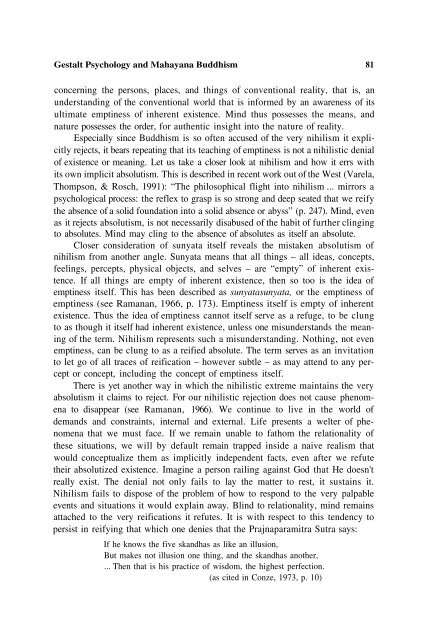Psychology & Buddhism.pdf
Psychology & Buddhism.pdf
Psychology & Buddhism.pdf
Create successful ePaper yourself
Turn your PDF publications into a flip-book with our unique Google optimized e-Paper software.
Gestalt <strong>Psychology</strong> and Mahayana <strong>Buddhism</strong> 81<br />
concerning the persons, places, and things of conventional reality, that is, an<br />
understanding of the conventional world that is informed by an awareness of its<br />
ultimate emptiness of inherent existence. Mind thus possesses the means, and<br />
nature possesses the order, for authentic insight into the nature of reality.<br />
Especially since <strong>Buddhism</strong> is so often accused of the very nihilism it explicitly<br />
rejects, it bears repeating that its teaching of emptiness is not a nihilistic denial<br />
of existence or meaning. Let us take a closer look at nihilism and how it errs with<br />
its own implicit absolutism. This is described in recent work out of the West (Varela,<br />
Thompson, & Rosch, 1991): “The philosophical flight into nihilism ... mirrors a<br />
psychological process: the reflex to grasp is so strong and deep seated that we reify<br />
the absence of a solid foundation into a solid absence or abyss” (p. 247). Mind, even<br />
as it rejects absolutism, is not necessarily disabused of the habit of further clinging<br />
to absolutes. Mind may cling to the absence of absolutes as itself an absolute.<br />
Closer consideration of sunyata itself reveals the mistaken absolutism of<br />
nihilism from another angle. Sunyata means that all things – all ideas, concepts,<br />
feelings, percepts, physical objects, and selves – are “empty” of inherent existence.<br />
If all things are empty of inherent existence, then so too is the idea of<br />
emptiness itself. This has been described as sunyatasunyata, or the emptiness of<br />
emptiness (see Ramanan, 1966, p. 173). Emptiness itself is empty of inherent<br />
existence. Thus the idea of emptiness cannot itself serve as a refuge, to be clung<br />
to as though it itself had inherent existence, unless one misunderstands the meaning<br />
of the term. Nihilism represents such a misunderstanding. Nothing, not even<br />
emptiness, can be clung to as a reified absolute. The term serves as an invitation<br />
to let go of all traces of reification – however subtle – as may attend to any percept<br />
or concept, including the concept of emptiness itself.<br />
There is yet another way in which the nihilistic extreme maintains the very<br />
absolutism it claims to reject. For our nihilistic rejection does not cause phenomena<br />
to disappear (see Ramanan, 1966). We continue to live in the world of<br />
demands and constraints, internal and external. Life presents a welter of phenomena<br />
that we must face. If we remain unable to fathom the relationality of<br />
these situations, we will by default remain trapped inside a naive realism that<br />
would conceptualize them as implicitly independent facts, even after we refute<br />
their absolutized existence. Imagine a person railing against God that He doesn't<br />
really exist. The denial not only fails to lay the matter to rest, it sustains it.<br />
Nihilism fails to dispose of the problem of how to respond to the very palpable<br />
events and situations it would explain away. Blind to relationality, mind remains<br />
attached to the very reifications it refutes. It is with respect to this tendency to<br />
persist in reifying that which one denies that the Prajnaparamitra Sutra says:<br />
If he knows the five skandhas as like an illusion,<br />
But makes not illusion one thing, and the skandhas another,<br />
... Then that is his practice of wisdom, the highest perfection.<br />
(as cited in Conze, 1973, p. 10)











